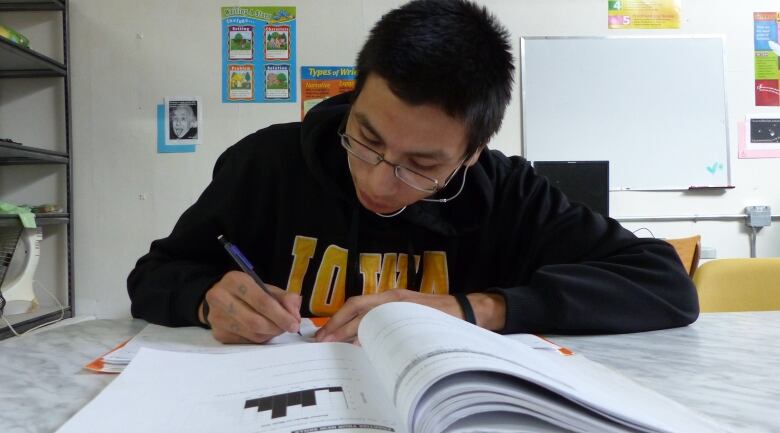The science of studying: How students can put their brains to best use
Exams can be stressful, but scientific research offers tips on how students can improve their marks

It's that time of year again: exams are here and students around the country are busy trying to cram as much information into their brains as they can.
Trying to retain several months' worth of information in a stressful situation can be challenging. Science offers some tips, however, on how students can maximize their ability to retain information.
Practice makes perfect
The brainis a marvel to neuroscientists who continue to unravel its mysteries. But some things about our grey matter are fairly well-known.
For example, our memories are stored in the prefrontal cortex, and the hippocampus plays an important role in transferring memories from short-term to long-term.
- Regina students win global contest on energy efficiency
- Student federal grants get bumped up starting August 1
And memories aren't stored in just one part of our brain, but rather are stored as groups of neurons, cells that send impulses throughout our bodies. When we attempt to recall something, the neurons fire in the same pattern as when the original event occurred. Recalling something over and over again strengthens that pathway.
Anew studyfrom Tufts University in Massachusetts found that giving yourself tests, as practice,not only aids in memory recall, but also in reducing stress.
When we're stressed, our bodies react physiologically: epinephrine (adrenalin) isreleased;our heart rate increases;we may begin to sweat.
About 20 minutes after the stress-inducing event, a delayed stress response occurs: cortisol is released into our bodies and binds to receptors in the hippocampus, which we need toretrieve information. Thecortisolmakes this recallmore difficult.
I think while we had hypothesized that retrieval-enhanced learning would reduce the stress effect, I didn't expect it to be completely eliminated.- Ayanna Thomas, Tufts University
The study compared the recall ability of two groups: one that used retrieval practice, the other that relied solely on studying. Those who were stressed and utilized practice studying outperformed those who simply relied on straight studying.
"It was as though they weren't stressed at all," saidAyannaThomas, associate professor of psychology at Tufts and senior author of the study.
It's not entirely clear why this was. But Amy Smith,graduate student and lead author of the study, has an idea.
"Retrievalpracticehelps you create all thesedifferentroutes to access memory," said Smith.
And she has some advice for students looking to improve their marks.
"I would recommend always reviewing your material first and then give yourself practice tests.Read your notes maybe once or twice and then push them aside and make yourself rememberas much as you can," Smith said."Then go back to check your notes: Did you remember everything? No? Then do it again."
Sleep on it
It seems like an obvious statement: get a good night's rest before a test or exam and you're likelyto do better. But it's surprising how many students fail to get enough rest. Often, that's sacrificed for cramming the night before. But it's a bad idea, for many reasons.

A studypublished in August found that the brains of people who don't sleep well tend to perform poorly on a memory test. That supports the theory that when we're awake we weaken memory connections. If we're awake too long, the connections between neurons (synapses) become saturated. This means we have greater difficulty retaining new information. Sleeping allows our brain to form new connections.
So forget the cramming and get a good night's rest. Your synapses need it.
It's all about balance
Schooling is stressful, but it turns outthat stresscan be useful if you manage it well enough.
Findings from astudyout ofConcordiaUniversity in Montreal suggestthat feeling bad about your effortscan actually help a student fare better in school.
"People often ask the question, why did we evolve to have negative emotions? What do they do for us? Well, they help us meet challenges they have this function ofsignallingto us that we need to change our behaviour in a way to protect ourselves," said Erin Barker, professor of psychology atConcordia.
If you can limit the negative feelings associated with either preparing for exams or getting poor results and you can move forward after that, then that's probably motivating.- Erin Barker, Concordia University
The researchers found that happy people improved their grade-point average (GPA) over time. What was more surprising was students whofelt worse than they normally did from time to time, performed even better.Their improvement was almost a full grade point above their earlier grade.
"If you can limit the negative feelings associated with either preparing for exams or getting poor results, and you can move forward after that, then that's probably motivating," Barker said. "The negative emotions are signals to you there's a challenge in your environment."
The key is to ensure that you continue with the good parts of your life: be social, sleep well, don't skip workouts.
"It's a balancing act," Barker said. "But it will help you deal with the negative."












_(720p).jpg)


 OFFICIAL HD MUSIC VIDEO.jpg)
.jpg)



























































































